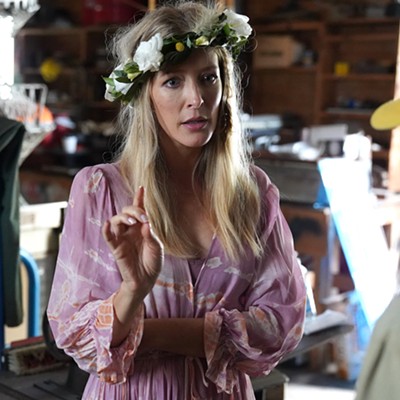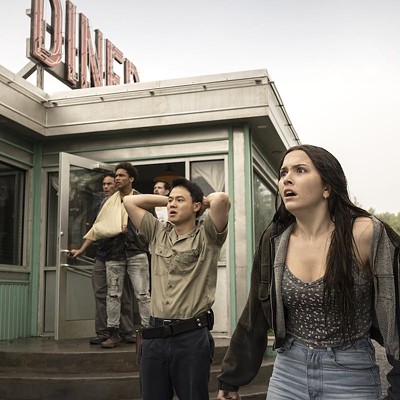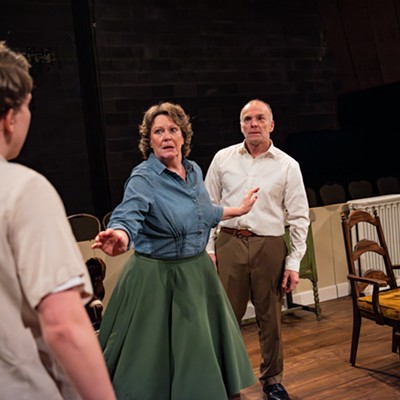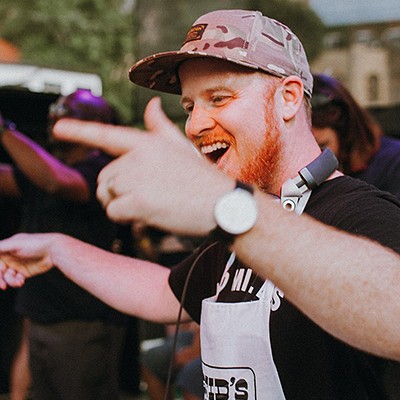"So, ya wanna be in pictures?"
You can imagine an agent or a producer, sitting behind a big desk in New York, Los Angeles (or even Toronto, for that matter) asking you the question. You're young, eager to learn, eager to work, attracted to the glamour of the film business. Maybe it's not so much that—maybe it's more about being a filmmaker, telling your stories with cameras, actors and the moving image bolstered by sound.
As it turns out, it can be done here in Halifax. But, like anywhere, it takes a lot of luck and hard work. And more than a little smarts and ambition.
"Go to school, baby. Then network your ass off."
"It is important to get an education," says Concordia graduate Eva Madden, a sound designer and filmmaker in town. "It doesn't have to be a film school education, it can be a volunteer education. But I learned how to write, direct. Importantly, I learned how to do audio and camera, so I was able to work when I got into the industry."
Madden works for Power Post Production on sound, but her passion is making films, something that is happening for her right now: Having completed a few shorts, she is working on post production for a documentary about singer Amelia Curran and is currently in development on a feature.
"You'll go a lot further if you come out of school willing to sacrifice rather than make money." She says breaking in as a director is a different thing from just trying to get work on a production, and suggests getting in touch with organizations such as the Nova Scotia Film Development Corporation and the NFB, and joining the Atlantic Filmmakers Co-operative. "They have programs that can help. I took workshops, I applied for scriptwriting programs." Madden says it's all the networking things that one does—not for cash, but so people in the industry get to know what you can do—that make the difference. "Once you get your break, you have to really impress people. Everyone wants to be in the film industry, but you have to be really good. Only the really good people make it."
"If this was easy, everybody would be doing it," says Michael Melski, a local filmmaker and TV director. He went to school in Halifax to be a journalist, but wound up working in theatre for years, and now is in New Brunswick to direct his first feature film as a writer/director—called Growing Op, it's executive-produced by Thom Fitzgerald.
"You really need to develop a work ethic that matches what your dream is," he says. "People buy into the idea it's a glamorous lifestyle, but it's a lot of work. Perseverance and endurance are two of the greatest skills you can have. Apart from being able to visualize and able to write, you really need to have that dedication."
You gotta work yer way up and pay yer dues."
"I don't think anybody knows what they want to do," says Erin Hennessey about people who find their way into movie and television production. She's a veteran of the Halifax film, TV, documentary and commercial industry—working first as a production coordinator and, now, as a casting agent.
"I think just see an opportunity for work. I've always said the film business is a haven for the otherwise unemployable. You know, the kids who didn't quite fit in at school. The ones who were skipping days and smoking too much pot and didn't really find anything challenging about it."
Hennessey is quick to point out that it's not that film work is easy—far from it—but that it requires an abundance of common sense, something that isn't always rewarded in an academic setting. "Some innate
problem-solving skills, logic, that sort of thing. Being able to think on your own. If you have that basic skill set and demonstrate it, even if you've been hired on for a day to drive people around in a van. People can tell if you have the thing or don't have the thing. If you say "I have to gas up the vehicle, what do I do?' that is some indication perhaps you don't have whatever it is."
No, you'll discover the movie industry isn't all that glamorous. Sure, if you get into production you'll meet some fascinating people, maybe even a few famous ones, but you'll lift their things, clean up their garbage or, worse, be on the receiving end of their inflated egos. And those film-school grads who think the entry-level production jobs like on-set or office assistants are the way to be taken seriously by the cinema artistes are in for a rude awakening.
"We don't hire those people," says Hennessey, imagining what must go through their mind: "Even though I've been hired to do the Starbucks run I'm going to stand next to the director or the client all day and offer my advice on how I think the shots should be."
Hennessey points out that on commercial shoots, which haven't suffered the film production industry's recent slowdown, the clients or the producers are on set, demanding an intricate structure of protocol and hierarchy. "I don't know how many times I've been pulled aside by a producer who's said, "Who the fuck is that guy? Get him away from the client. I never want to see him again.'"
But it's not all grunt work, power-mad executives and interminable hours, or no one would do it. It's about learning a craft, learning how film sets work, learning to understand the specialized skills of the camera people, sound, grips, sets, props, wardrobe, actors, lighting, locations and so on, and maybe joining one of those departments along the way.
"It comes with hanging around on film sets and watching how things work, how quickly things need to happen and what's the best way," says Hennessey. "I guess you can go to school as well, but I didn't and I work with a lot of people who didn't either."
Hennessey's had her share of great experiences too, from helping Kevin Spacey score an Egg McMuffin after 11am at a McDonald's drive-thru in Newfoundland, to being given the gift of a small piece of the Titanic to hanging with the world-class technicians shooting a documentary about the White Stripes as they toured through Atlantic Canada. But, aside from just trying to make contact with production coordinators and managers in town and being available to do anything, the best advice she can give to people who want to work in production is, "Get a fucking driver's licence. Seriously, you're not going to get a job unless you know how to drive."
"Go do it yerself, punk."
"About two years ago I just went and bought a camera," says performer and independent digital filmmaker Andrew Bush. "So I just thought, "I'm just going to shoot my own stuff and it'll probably suck but I'll see what happens.'"
His camera is a digital Panasonic DVX 100A. "I bought mine used for $3,000, but you could probably get one for $2,500 now, maybe $2,000. The quality is just wonderful." He bought a 35mm adaptor, so he can use old 35mm lenses, which makes his work look even better, and he uses a laptop computer to edit the work. He raves about a website called DVXuser.com that taught him "everything about filmmaking." His shorts are done fast and dirty, with his actors becoming crew members, holding the boom mic when not in shot.
Bush dropped out of Dalhousie drama to be a host on Street Cents, the late, lamented CBC afternoon kids show that was produced in Halifax from 1989 to 2006. He directed a few of the skits on the show before heading to Toronto for a few years to pursue acting. Now, back in Halifax, having written, performed and directed a number of bits for the comedy troupe Picnicface, he's found an audience for them online, thanks to YouTube and FunnyorDie.com, where Will Ferrell saw his stuff and became a fan. Bush is helping put together FunnyorDie.ca, where Picnicface is the in-house comedy troupe.
"I'm just trying to shoot as much as possible," Bush says. "Maybe 15 short films so far."
To make ends meet he's done other work in the industry, writing for Robson Arms and Canadian Idol, but says despite his success so far he could be "working at Subway sometime soon." He also recommends joining a film co-operative such as AFCOOP, to meet other filmmakers and have access to film tech.
"It's a fantastic opportunity to cut your teeth on professional equipment." He admits that he has no idea how to get grants to produce larger films, but says he is an expert in "making a short for $10, $15. Of course, that's pulling favours and not paying the actors. My suggestion is, get a camera, learn it, learn what it is to film something. Just get out there."
FILM SCHOOLING 101Actra Maritimes: www.actramaritimes.caAFCOOP: www.afcoop.caCentre for Arts and Technology: www.digitalartschool.comCFAT: www.centreforarttapes.caFilmworks casting services: www.filmmakers.ns.caNFB: www.nfb.orgNSCAD: www.nscad.ns.caNSCC: www.nscc.caNova Scotia Film Development Corporation: www.film.ns.ca
Robert Rodriguez calls, looking for Halifax locations. If you scout along the waterfront, click here.
If you decide to hunt for filming locations by touring the city’s neighbourhoods, click here. Or, consult the Table of Contents.














